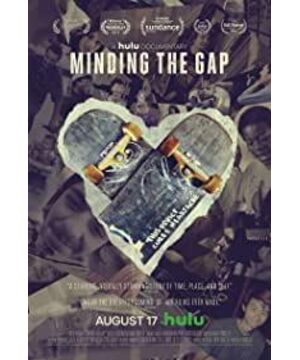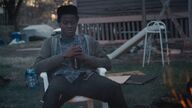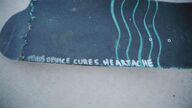Minding the Gap, "The Crack of Love and Pain"/"Skateboard Boy", this is the most touching and resonant documentary I saw at this year's Guangzhou International Documentary Festival. A film full of social problems, such as domestic violence, single-parent families, alcoholic fathers, racial discrimination, etc., is drawn out by skateboards that symbolize freedom, coolness, excitement, unrestrainedness, vitality, and enthusiasm.
The three skateboard companions grew up in the rust belt - Rockford in the northeastern industrial area of the United States. During their growth journey, from childhood to adulthood, they experienced deep love and pain, love and hate, and almost the same social problems , different life trajectories.
At the age of 23, Zach became a father. He was a roofer with a precarious job, and his 21-year-old girlfriend was a restaurant waiter. Longing for personal free time; his girlfriend works full-time and wants to enjoy social life after get off work. The issue of taking care of the baby has become the fuse of the conflict between the two. In the end, the conflict escalated, Zach became violent, his girlfriend left the house with the child, Zach drank heavily, and relied on the financial relief of his new girlfriend, and he was sinking day by day. Although Zach knew that this negativity had derailed his life, he continued to slump and let his life go dark.
Compared to Zach, Kyle's life is about turning negative experiences into positive motivation. Kyle's youth is also a painful memory. He was beaten, scolded and disciplined by his father, his parents divorced, and his brother stole his money when his father died. In a smoky family, Kyle who dropped out of high school started out as a dishwasher, and the work intensity was very intense. He is often racially discriminated against because of his black identity; Kyle's life is also full of love and positive energy. Despite his father's domestic violence, he still gave Kyle a correct moral view, not stealing or robbing, and strict rules. Kyle also loves his father to a certain extent. Kyle did a good job and was promoted to a waiter, and his life slowly saw light, and he had the courage to leave the place where he was confined, small, and oppressed by various social problems, and went to Denver to pursue and look forward to a better future.
The director of the film, Liu Bing, is also a victim of domestic violence. His stepfather beat him when he was a child, and even often beat his mother. Under his stepfather's increasingly serious domestic violence, they finally left him. Childhood caused a heavy psychological shadow to Liu Bing, like a nightmare. Liu Bing picked up the camera and recorded the life of himself and his former skateboarder, corresponding to the complicated relationship with his friends around him, so he made this documentary. He interviewed his mother, even though her mother was reluctant to recall, she was also a poor victim who was afraid of loneliness. She opened up her heart in order to make Liu Bing get out of that painful memory. Liu Bing also seems to be healed while filming this documentary.
The three unfortunate families are similar, and the lucky directions are different. Zach's negativity, Kyle turned negativity into positivity, and Liu Bing turned negativity into healing and influencing others. The pain is still there, escape is not the way, the galloping skateboard will never take the pain away, it depends on how you look at it and digest it. Love is always there too, see how you accept and transform it. However, between love and pain, there are many unbearable lightness in life.
Text / Yi Xiaohua
View more about Minding the Gap reviews







